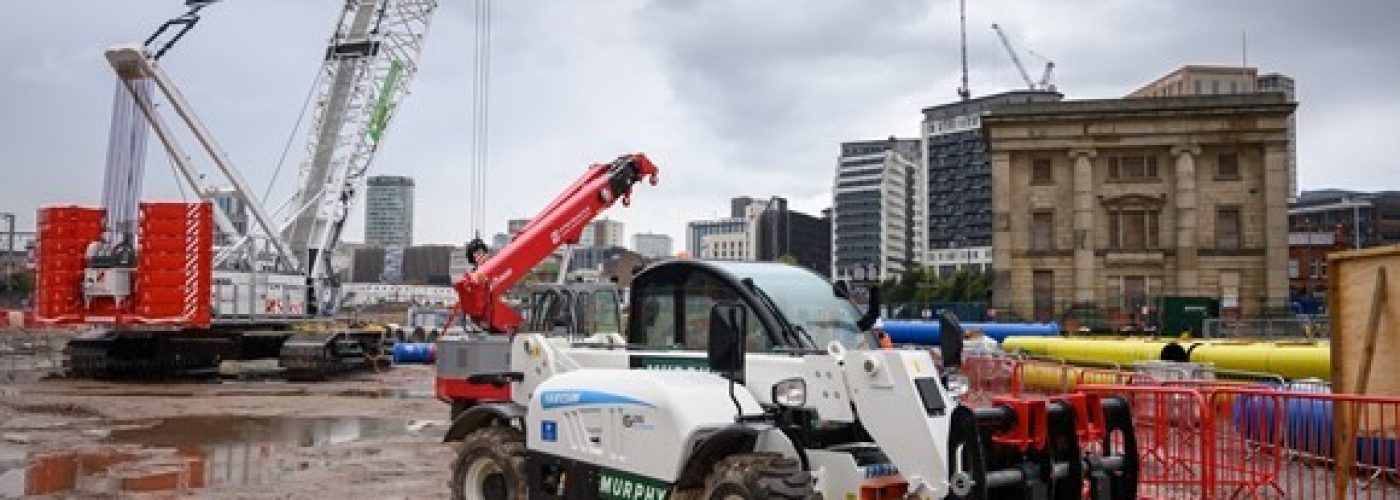On the first day of Birmingham’s Clean Air Zone HS2 Ltd outlines how the project’s new low-carbon technology will support Birmingham City Council’s objective to reduce pollution and improve air quality in the city.
HS2 is going way beyond requirements to lower carbon and emissions on its construction sites, and with HS2’s Curzon Street Station site in the city centre, the project confirms that the use of the latest, cleanest technology will lower emissions, protecting the environment and keeping people safe.
A whole range of innovations are being introduced to cut emissions and improve local air quality, not just in Birmingham but right across the project. These include hybrid, zero emissions machinery, renewable energy, alternative fuels and recycled products.
In addition, HS2 is leading a series of ground-breaking trials in conjunction with academia and its supply chain, set to bring massive improvements in local air quality and welfare conditions for construction site workers, with wider positive public health and environmental benefits for communities.
The project has set standards for the use of the lowest emitting vehicle engines across all contractors, as well as set targets for contractors to go beyond these, as technology improves. In addition, the project has also set industry leading emissions standards for all machinery including excavators, dumpers, large cranes and piling machines.
HS2’s top ten air quality innovations:
- The UK’s first 250-tonne all-electric crawler crane which is has zero emissions.
- A 15-tonne electric road sweeper which saves over 100kg of CO2 emissions per day in comparison to a diesel sweeper.
- Trialling the use of alternative fuels, including a hydrogen dual-fuel system in construction vehicles.
- Trialling the use of renewable energy solutions (solar and wind) to replace diesel generators, reducing fuel usage and cutting carbon emissions.
- New ultra-clean generator technology developed by a collaboration of three UK technology companies which replaces diesel with bio-LPG, set to cut carbon, lower emissions, reduce noise and deliver major cost savings.
- The world’s first retrofit on large construction equipment allowing contractors to upgrade older machines to meet the latest emission standards, helping to reduce impacts across the whole HS2 project, and across the construction industry.
- The first infrastructure project to adopt the new advanced emissions identification scheme developed in collaboration with the Construction Equipment Association (CEA).
- Multiple Nixon Hire solar pods powering sites through harvesting and storing solar energy to minimise emissions, and EcoSmart ZERO cabins using a combination of solar and hydrogen fuel-cell technology to eliminate carbon emissions from construction sites.
- Cutting emissions by transporting materials by freight train, with 15,000 freight trains set to move 10 million tonnes of aggregate for HS2 over next ten years.
- Strict requirements for all contractors to control and limit their dust, air pollution, odour and exhaust emissions during works.
HS2’s Air Quality Lead Andrea Davidson said:
“It’s vital that we improve air quality in our towns and cities. As construction work ramps up across Phase One, HS2 is working with our contractors, supply chain, UK manufacturers and academia to cut emissions by developing ways to reduce reliance on diesel, and to promote the use of alternative technologies such as full electric, renewables, hydrogen fuel-cell and hybrid technology.
“Birmingham Clean Air Zone is also about encouraging people to change their transport habits. By providing a cleaner, greener way to travel, HS2 will help cut the number of cars and lorries on our roads, cut demand for domestic flights, and help the country’s push to reduce carbon emissions.”
In 2017, road traffic accounted for 91% of transport emissions. In the same year cars, taxis and light vans were responsible for 70% of road transport emissions. By moving high speed trains on to a new, dedicated intercity line, HS2 will free up space on the existing rail network to run more local and regional commuter trains.
With more reliable, local frequent stopping services available, people will be able to make the shift from road to rail and cut their carbon footprint. This will help to reduce emissions from road transport, reduce congestion and improve the quality of our air.





